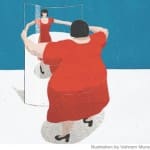 Writing this post about fat denial was a real eye-opener. How can a person who is overweight or obese be in denial about their weight? I understand how an alcoholic can be in denial or a drug addict but a person who is overweight?? How can this be?? Isn’t it obvious? The answer is, as with most questions involving human behavior, complex.
Writing this post about fat denial was a real eye-opener. How can a person who is overweight or obese be in denial about their weight? I understand how an alcoholic can be in denial or a drug addict but a person who is overweight?? How can this be?? Isn’t it obvious? The answer is, as with most questions involving human behavior, complex.
There is a neurological explanation for ‘fat’ denial. The tendency for people to be in this sort of denial, according to Tara Parker-Pope (see New York Times blog, (2012/04/18) is consistent across cultures and age groups. The brain, she says, particularly the posterior parietal cortex, integrates signals from all senses to form our body image. Because the body changes over time the brain must constantly change its perception. This internal calibration system sometimes can go haywire. Thus we have body dysmorphic disorders seen in all spectrums of eating disorders, especially when moving to the extremes, from the anorexic now apparently to the obese.
Body dysmorphic disorder is readily acknowledged in the literature regarding anorexia. However, in a recent study, we see the same phenomenon amongst the obese. “Among the obese, 75 percent placed themselves in the overweight category and only 10 percent accurately described their body size” (Parker-Pope, 2012). It appears that the more obese a person is the more in fat denial they are.
There is also a sociological explanation for fat denial. As our societies become increasingly overweight we (Tara Parker-Pope , 2012/04/18) enter into collective denial. We start to compare ourselves to others and we are swayed by the collective norm, loosing sight of healthy weight parameters. Children, who may not have been exposed to healthier parameters, can especially be affected. If their parents and peers are overweight, then the higher weight may appear normal to them.
The concept of ‘ego depletion’ is useful towards explaining ‘fat denial’ and the negative consequences of this.
Willpower is a finite resource. There have been studies done that illustrate this. In one experiment a group of students were made to feel unwanted and bad about themselves. Another group, were made to feel just the opposite ie very good about themselves. Each group was shown into a room with a plate of cookies. Needless to say it was found that the group with confidence were able to exercise willpower and eat the cookies in moderation. However, the insecure group, the ‘ego depleted’, gorged and showed very little willpower.
This social experiment showed us that people who feel bad about themselves or feel excluded from the social group are less likely to exercise their ‘will’. Social exclusion impairs self-regulation. Attachment to ‘group’ contributes to our well being and thus our ability to moderate our emotions and desires. Social scientists as far back as Durkheim have written about this.
Thus, it seems that the more obese a person becomes the less likely they are to see themselves as such….and the more alienated they feel from a society which devalues the obese, the less likely they are able to alter their diet. Especially from the addictive foods that require superhuman or collective will.
We now know though, that with a sense of belonging to a larger group and with encouragement from that group we are able to better exercise our willpower. The Twelve Step Groups generally and ‘Overeaters Anonymous’ particularly have proved to be the answer for so many people. These groups encourage a sense of belonging, they acknowledge obesity and its consequences and provide a warm, safe and honest environment in which to begin recovery.